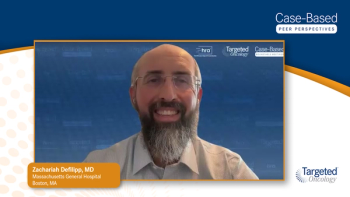
Evolution of SCAC Treatment: NIGRO Protocol Foundation to Current NCCN Guidelines
Panelists discuss how successful treatment of locally advanced anal cancer requires a multidisciplinary approach involving colorectal surgeons, radiation oncologists, pathologists, medical oncologists, and physician assistants. They emphasize the importance of proper histological classification to distinguish squamous cell carcinoma from adenocarcinoma.
Episodes in this series

Treatment Planning and Preparation
Locally advanced anal cancer requires a comprehensive multidisciplinary approach involving surgeons, radiation oncologists, pathologists, medical oncologists, and midlevel practitioners. The team emphasizes the critical importance of accurate pathological diagnosis, as poorly differentiated rectal cancers may be squamous cell carcinomas of the anal canal (SCAC) requiring different treatment approaches. Proper immunohistochemistry evaluation, including cytokeratin staining, helps distinguish between these entities.
Baseline assessment and patient preparation strategies focus on comprehensive counseling about expected adverse effects, particularly how toxicities accumulate over time during chemoradiation. The first half of treatment typically proceeds smoothly, whereas the second half presents mounting adverse effects that may persist beyond treatment completion. Fertility counseling is crucial, especially for younger patients, given the detrimental effects of pelvic radiation on reproductive function.
Patient optimization includes ensuring adequate pain management with appropriate bowel regimens to prevent constipation, which can severely impact quality of life. Regular monitoring every 1 to 2 weeks during treatment helps manage adverse events, maintain hydration, and address electrolyte abnormalities. In rare cases, temporary diversion may be necessary for patients with severe symptoms or high immunosuppression risk, although this should be carefully coordinated with experienced colorectal surgeons to avoid unnecessary interventions.




















